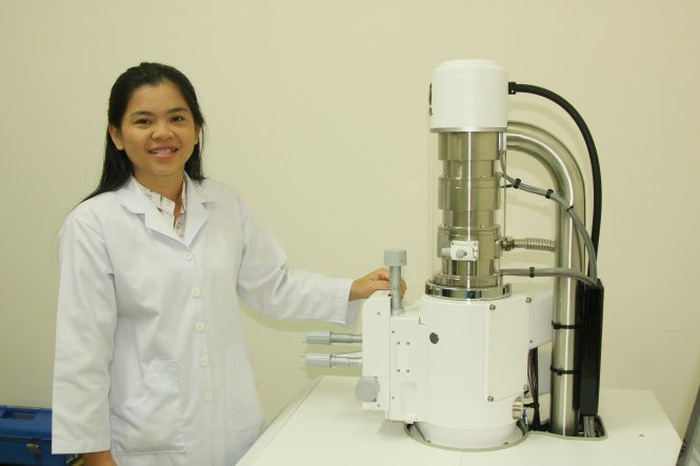A Vietnamese scientist has been honored with the UNESCO for Women in Science Awards for her successfully implemented research project which aims to create a gel able to treat wounds effectively and safely.
Nguyen Thi Hiep was among winners of the L'Oreal-UNESCO for Women in Science International Rising Talents 2018 award, given last month in France.
Jointly supported by UNESCO and cosmetics producer the L’Oréal Foundation, the program annually chooses the most prominent candidates out of 275 young female scientists to be awarded the L’Oréal – UNESCO fellowships, in order to encourage women on their scientific path.
Hiep, who has spent more than ten years studying biomaterials, is a doctorate lecturer in biomedical engineering at the Ho Chi Minh City International University – a member of the collegiate Vietnam National University-Ho Chi Minh City, a prestigious higher education institution.
“I was really surprised and proud. The honor is globally highly selective. I rejoiced to see Vietnam’s map appear in the ceremony,” the 37-year-old talked of her award.
She owes the achievement to her project launched in 2013, entitled the '21st Century First-Aid Kit,' which aims to produce a type of gel that can be used for various wounds, to remove bacteria and help generate tissues at the injury rapidly.
The smart gel partly combines an acid aiding cell proliferation and migration, known as cross-linking hyaluronic acid, and complex molecules, or chitosan in technical terms.
Diversity in application of the product is enabled by other ingredients like silver and curcumin – a chemical commonly found in ginger.
She said that hemostatic materials, those that stop the bleeding, on the current market only provide a temporary effect, for the injured have to take them away after being hospitalized.
That is why she has desired to create the gel which obviates the need for the removal while serving as the substitute for lost tissues at the wound.
“In the future I’ll continue to develop the gel so that it can be used on cancer patients with tissue loss,” she said.
Huynh Thanh Dat, director of the Vietnam National University-Ho Chi Minh City, said Hiep’s ultimate goal with the award-winning project is to make products poor people and those facing limited access to medical care or living in remote areas or on islands can afford.
“As a female scientist, she has tirelessly tried to make significant contributions to the growth of biomedical engineering,” Dat said.
Hiep has tested the first-aid substance on pigs with promising results, and is planning to perform more clinical trials.
The greatest hindrance, she said, is money.
She needs mass sums purchasing chemicals for experiments, paying students working for her and keeping pigs, while the experiments are particularly prone to failure.
She has received VND2 billion (US$88,000) worth of assistance from a U.S. organization and is soliciting more from the Vietnam National University-Ho Chi Minh City.
Her efforts are hailed with complements.
She won the first prize on the development of devices used in cell culture by Korea’s Soonchunhyang University in 2011, a fellowship by the L’Oréal-UNESCO for Women in Science Program in 2016, and the ASEAN-U.S. award in 2017.
Like us on Facebook or follow us on Twitter to get the latest news about Vietnam!



















































